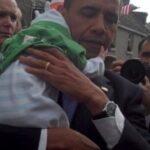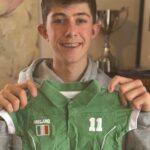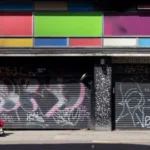Breaking News
‘Nothing left’ in Gaza says doctor evacuated to Ireland
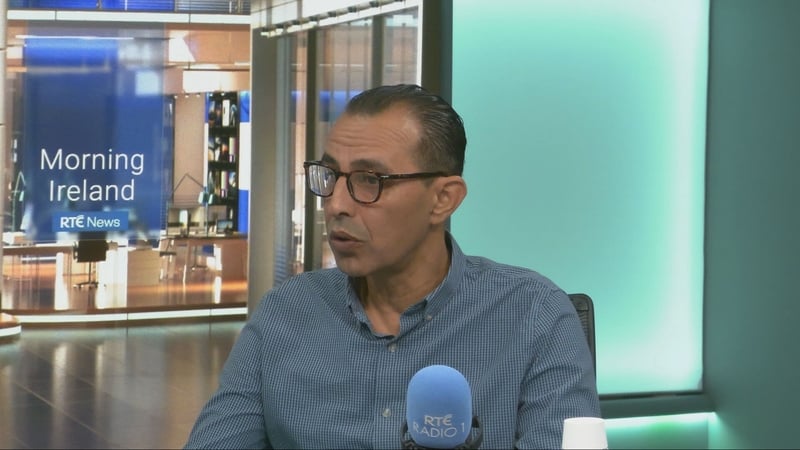
Read more on post.
A doctor who had been working in Gaza until his evacuation to Ireland last week has said there is nothing left there.
Deputy Medical Coordinator for Médecins Sans Frontières in Gaza, Dr Mohammed Abu Mughaisib, said he did not recognise the streets of Rafah while he was being evacuated as they were just rubble.
Speaking on RTÉ’s Morning Ireland, he said hospitals are collapsing one by one.
“The population now in the north area has an evacuation order to move to the south. One million people are struggling to move,” he said.
“They are asking them to move to the south area, which was called the ‘humanitarian zone’. It’s not a humanitarian zone.
“The hospitals are collapsing one by one, which are in the north. Patients are actually in these hospitals, are lying on the floor there. There is no beds at all.
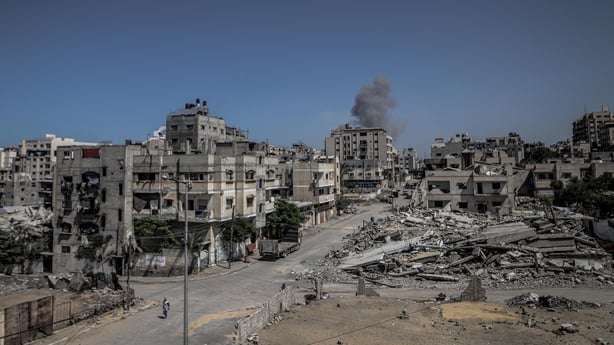
“Gaza [is] destroyed socially, physically, materially, and psychologically,” he said.
Dr Abu Mughaisib said hospitals are functioning without electricity because there is no fuel to run the generators.
He said they desperately need drugs and disposables to operate and treat patients.
“So doctors now are consulting the patient without giving any treatment because there is no more treatment,” he said.
“The population still are struggling to find shelters, which there is no space, there is no tents, struggling to find water.
“There is no term to describe what’s going on in Gaza… there is neighbourhoods erased from the planet.”
Watch: Dr Mohammed Abu Mughaisib speaking in Dublin this morning
‘Acute hunger’
Dr Abu Mughaisib said he was “lucky” because he managed to evacuate his family to Cairo while he stayed in Gaza and moved around.
“I used the electricity unit room to put my mattress [in]. I mean, that was your life – your mattress, your pillow, and your documents,” he said, adding that while he was able to afford food because he was working, there was no food to buy.
“It was a kind of luxury to find bread and to buy it, it’s very expensive. The cost of one bread was €5 … I can afford it, I’m still working,” he said. “But imagine the population – 80% of them are in poverty.
“There were children … crying in the tent because their families cannot provide for the milk or food, and they were crying because of hunger, and they sleep because they get tired from crying, so they sleep.
“There was acute hunger. Famine – I was not waiting to declare the famine in Gaza because we witnessed it, me and my colleagues who are working with MSF.”
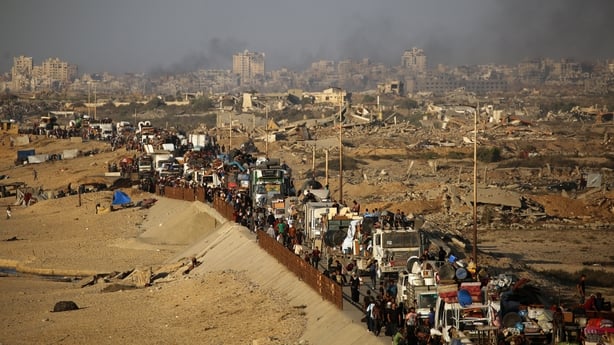
Dr Abu Mughaisib explained that he applied through MSF Ireland to come here “and the Irish Government and embassy really facilitated my work papers”.
He said the evacuation was well organised by the Irish Embassy, but the trip itself inside Gaza was “really horrible”.
“When I entered some areas in Gaza during the evacuation, I didn’t recognise Rafah, I didn’t recognise Khan Yunis. It was just rubble,” he said.
“And the tanks, of course, are there. They were blocking the road but they open it and they allow the convoy, but I didn’t recognise none of these streets of Rafah and Khan Yunis that I know it by heart.
“I’m living there for 25 years so I know Gaza by heart. I didn’t recognise no street.”
Dr Abu Mughaisib said he has not seen his family in over 18 months and would like to be reunited with them.
He said he has found it “very strange” to be in Ireland.
“I have really mixed feelings. It’s very difficult to wake up without the sound of the drones, the shelling, the bombing. And I left all my memories there,” he said.
“I have friends, colleagues, families there that are. I know that they are still suffering and they wanted to be evacuated, to be in security.
“But it’s difficult. I still have my heart, my soul is there. Physically, I’m here, but my heart and soul is there.”
Read more:
Situation in Gaza City ‘like a horror movie’, says doctor
‘It’s an act of piracy’ – Irish activist on Gaza aid flotilla slams drones targeting boats
Latest Middle East stories
Breaking News
Café Sol pesto pasta and chicken recalled over listeria

Read more on post.
The Food Safety Authority has recalled a batch of Café Sol pesto pasta and chicken over the presence of listeria.
The impacted product has a use by date of 25 September 2025 and weighs 224g.
The FSAI said notices will be displayed at point-of-sale and urged those who purchased the product not to eat the affected batch.
Retailers have been requested to remove the pasta dishes from their shelves.
Distributors have been asked to contact their impacted customers, recall the affected batch and also provide a notices in their premises.
Symptoms of listeria monocytogenes infection can include mild flu-like symptoms, or gastrointestinal symptoms such as nausea, vomiting and diarrhoea.
In rare cases, the infection can be more severe, causing serious complications.
Pregnant women, babie, and people with weakened immune systems, including the elderly, are more vulnerable to such infections.
The time between initial infection and first symptoms appearing is on average three weeks but can range between three days and 70 days.
Breaking News
Swinney apologises to injured footballer over ambulance wait
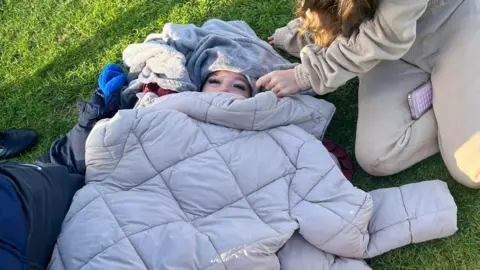
Read more on post.
First Minister John Swinney has apologised to a young footballer who had to wait five hours for an ambulance after breaking her leg.
Brooke Paterson, 19, was injured while playing for Linlithgow Rose away at Cumbernauld United in North Lanarkshire on Sunday.
The central midfielder from Bo’ness, near Falkirk, has since undergone surgery in Forth Valley Hospital.
Speaking in parliament, Swinney apologised to Ms Paterson and expressed his “regret” at the situation.
The Scottish Ambulance Service (SAS) has also apologised for any distress caused by the delay in getting to the match, which it said was due to high demand and hospital turnaround times.
After the case was raised by Scottish Labour leader Anas Sarwar at First Minister’s Questions, Swinney said that it appeared the ambulance call had been misclassified, meaning it did not have “the priority it should have had”.
“That is not acceptable,” he said.
“That is an error that has been made and we have to look into whether that is the case and whether there are other steps that need to be taken to remedy that.”
Sarwar accused Swinney of having “broken the system” and said families across the country were suffering as a result of waits for accident and emergency treatment.
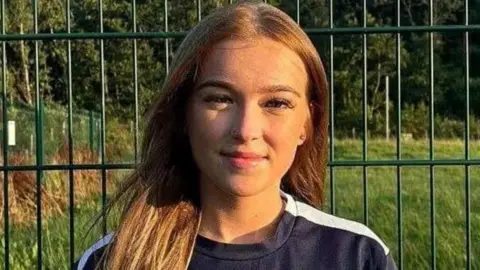 Charlene Paterson
Charlene PatersonMs Paterson said she ran to get the ball at the same time as a United player during the Lowland League match.
“She went for a slide tackle and I got the bad end of it,” she told BBC Scotland’s Drivetime programme.
“It just snapped straight away. I heard the snap and knew something bad happened.
“I just remember being in total agony and screaming and crying. I couldn’t focus – people were trying to talk to me and I couldn’t hear anybody. I was in a lot of pain.”
Teammates and onlookers at Guy’s Meadow Stadium rushed to her aid and several phoned for an ambulance after realising the seriousness of her injury.
“The ambulance said that it wasn’t a 999 emergency and I had to wait,” she said.
“The hours kept adding on and adding on, and I was getting more and more upset and frustrated. I was cold as well because I was lying on the ground.”
People covered her in jackets to keep her warm and comfortable as it got dark.
“I was more annoyed at the fact that they let me lie there on the wet grass, completely freezing with a bad injury,” she added.
“They took their time to come and get me. I just couldn’t believe they could do that to anyone.”
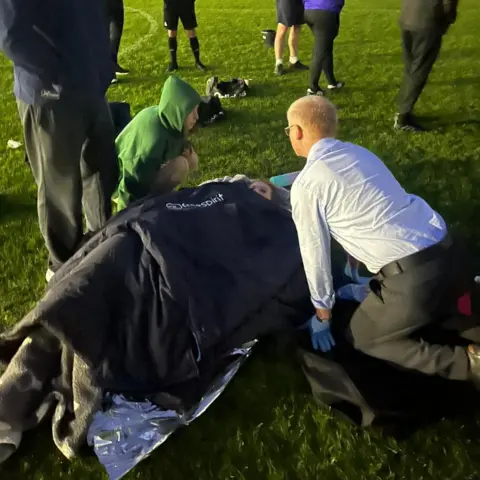 Charlene Paterson
Charlene PatersonWhen asked if the apology from the SAS was enough, she said: “I don’t know.
“I don’t know that they won’t do that to someone else and it’s obviously happened before. An apology isn’t enough to fix these problems.”
It is not known when Brooke will leave the hospital, as she is still struggling with the pain as well as putting weight on the injured leg.
“I’m just really, really sore and tired all the time,” she said.
The footballer said she had suffered bad injuries before, adding: “I know I can come back from something like this, but I know it’s going to take a while.
“I just need to remember why I play football in the first place and that will keep me going. It’ll get hard at points but I can’t give up. I’ve came too far to give up on football now.
“When I’m playing football, all my worries go out the door. I don’t have any problems when I’m playing football. It’s always brought me joy no matter what.”
Ambulance apology
A SAS spokesperson said: “We would like to sincerely apologise to Ms Paterson for the delay in the ambulance response and for any distress caused.
“We can confirm that we received a number of calls on 21 September to attend this incident but due to high demand and hospital turnaround times which ranged between 90 minutes to three hours in the area, this significantly delayed our response and we unfortunately could not attend immediately.
“When a time is appropriate, we would ask Ms Paterson or her family to contact our patient experience team directly so we can look into this case further and personally discuss our response. We hope Ms Paterson is recovering well.”
Breaking News
TB cases in Ireland expected to hit 300 this year

This post was originally published on this site.
The number of tuberculosis (TB) cases in Ireland is expected to hit 300 this year, the highest number since 2018.
Prof Anne Marie McLaughlin from St James’s National TB Centre said the incidence has increased by nearly 30% in the past two years – much of which was due to the increase in homelessness.
“Approximately 60% of our patients are foreign-born, who are living in IPAS centres or experiencing homelessness,” she said.
She explained that 30% of patients are Irish-born who are often immuno-suppressed due to issues such as cancer medications.
Prof McLaughlin said prisons are another area of concern, particularly given Ireland experienced “one of the biggest outbreaks in the world” of TB between 2009 and 2010.
“We can cure TB, and that the really good news story. It is 100% curable.”
However, Prof McLaughlin said additional Government funding was required to introduce a new app which enables her medical team to ensure that patients are taking the medicines they have been prescribed.
“The cost of that is €11,000 per annum for a licence, which is nothing by comparison to the cost of what we previously used – which was public health nurses visiting patients or getting patients to visit them. That cost around €350,000 per annum,” she added.
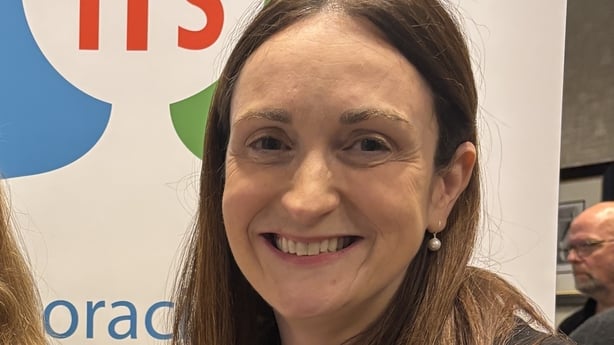
Prof McLaughlin is also seeking funding for a drop-in clinic for patients, given that it is “very hard” for patients who are homeless to abide by scheduled medical appointments.
“If they develop a problem in-between, we’re the only experts who can deal with it. They can’t just go to their local GP because this is really niche stuff,” she said.
Prof McLaughlin was speaking on World Lung Day at an event organised by the Irish Lung Fibrosis Association and fellow organisations,
Lung fibrosis is a life-limiting very serious and progressive condition affecting 5,000 people across Ireland.
Maureen O’Donnell of the ILFA said today’s event in Dublin was to try and raise awareness of the condition.
She said her association is campaigning for “equitable care” so that no matter where patients live in Ireland, they are able to obtain the care they need.
“75% of our patients are not offered pulmonary rehabilitation, which is critical for them to be able to live a longer life,” she said.
If not, she warned, it will take time off their lives.
-
Culture2 days ago
Taylor Swift’s new cinema outing generates more than €12million in just 24 hours
-
Environment1 week ago
Chimps drinking a lager a day in ripe fruit, study finds
-
Politics2 days ago
European Parliament snubs Orbán with vote to shield Italian MEP from Hungarian arrest
-
Culture2 weeks ago
Life, loss, fame & family – the IFI Documentary Festival in focus
-
Health3 days ago
EU renews support for WHO’s Universal Health Coverage Partnership
-
Culture2 days ago
Twilight at 20: the many afterlives of Stephenie Meyer’s vampires
-
Environment5 days ago
Key oceans treaty crosses threshold to come into force
-
Culture2 months ago
Fatal, flashy and indecent – the movies of Adrian Lyne revisited












